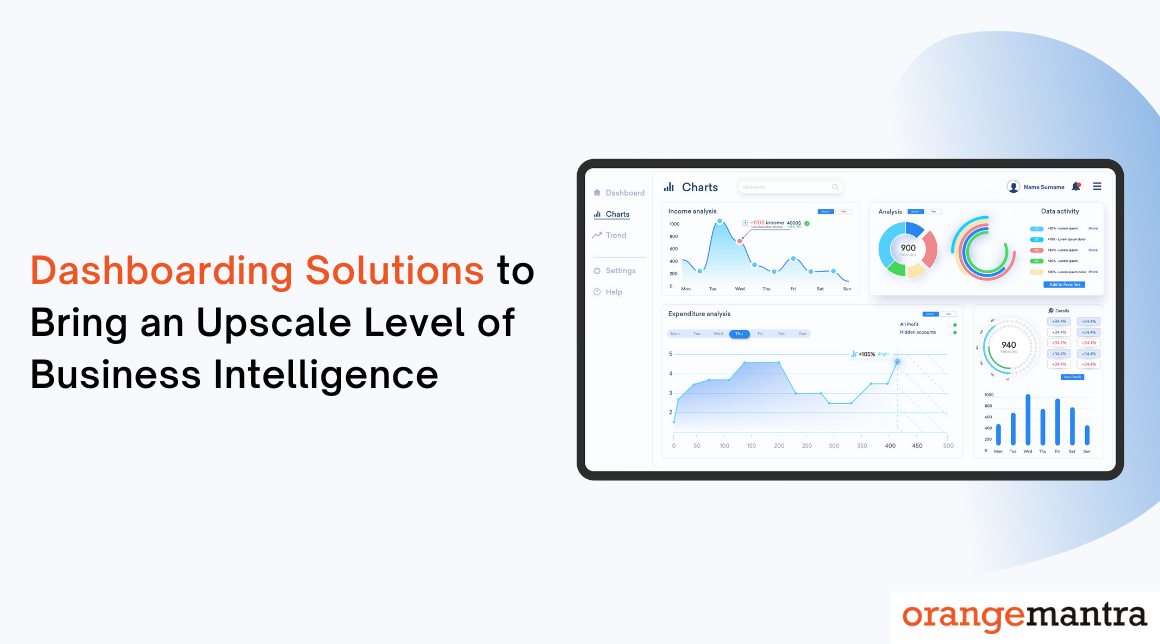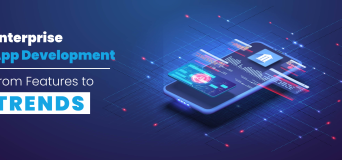In todays rapidly evolving and tech-driven business environment, crucial business data must be at your fingertips. It enables companies to strategize and make quick decisions for rapid growth. Using end-to-end Dashboarding Solutions, you could convert business information into profitable decisions.
Data is one of the critical aspects and assets of a business. It enables the organizations to apply emerging tech practices like Big Data analytics and perform growth-driven operations. Whether enterprise data is available in the structured, semi-structured, or non-structured format, dashboards can visualize everything. Businesses must know where to look to get the crucial data to different organizational departments, analyze it, and make strategic decisions.
Luckily, business data dashboards are available to act as centralized platforms to view data metrics across departments. In a way, dashboarding enables business intelligence to provide direct, 24/7, and easy accessibility towards data-based insights in a hassle-free manner.
Besides the accessibility of different organizational data, several benefits belong to distinctive types of dashboarding. So, over here, look at the crucial role of data dashboarding, its different types and key reasons to implement the same.
Role of Dashboarding Solutions in Business
Data Dashboards or better referred to as the Business Intelligence Dashboards are result-oriented tools for business. It is designed by real-time dashboarding experts to process, view, analyze, and display a specific set of business information belongs to different departments. It is a centralized data-accessibility platform that combines the information accessibility for operations, development, marketing, Project management, HR, and other departmental information.
Top Features of Business Intelligence Dashboarding
* Displays the Key Performance Indicators (KPIs) of different departments to view the status, measure the performance, and track progress.
* Fully integrated with business databases, files, departments, services, and APIs in the backend to get real-time insights.
* End-to-end data visualization in the form of graphs, tables, charts, percentages, and more.
* Easy integration with Google Analytics to track marketing operations. It allows tracking specific marketing metrics of the organization’s products and services and create a customized set of goals.
Different Types of Data Dashboarding Solutions
In general, we can divide business dashboards into three categories like the following:
* Analytical Dashboards
* Operational Dashboards
* Strategic Dashboards
Depending on the diverse requirements of the organization, you can choose any one of the above or all three dashboarding solutions.
In the next section, we will dive into the functioning of all the available dashboarding here.
1. Operational Dashboards
One of the most common yet important dashboards for every digital business organization is the Operational Dashboard. It helps businesses monitor the KPIs of operations belong to a diverse set of departments. The dashboard brings useful insights into the process operations tracking on a daily, weekly, and monthly basis. It also takes care of the way to handle operational trends on a daily, weekly, and monthly basis. Overall, an operational dashboard ensures the fact that your business runs smoothly at different levels. It keeps a close eye on every single piece of data to analyze and make decisions.
Target Users: To manage end-to-end business operations divided among different departments, managers and top-level heads have access to such a dashboard.
Benefits
* Keep close water on key metrics of business to improve process, performance, and teams.
* Discover enterprise-level issues in real-time, raise alerts, and ensure quick response.
* Highly useful for maintaining an enhanced level of customer service.
2. Analytical Dashboards
As the name implies, Analytical Dashboard uses heavy data types to process and analyze per different business requirements. It contains a variety of data including trends, comparison, predictions, distributions, and historical data. The primary objective of such a dashboard is to find answers to specific questions after analyzing a major chunk of data. It further features filters to drill down inside a plethora of business information, ultimately useful for business and data analysts, managers, and other stakeholders.
Target Audience: Analytical dashboard is best accessible by middle and senior-level managers along with executives as well. All such stakeholders have direct access to the data analysis on the dashboard to investigate and find answers to relevant questions.
Benefits
A useful tool for business organizations to visualize and analyze the vast amount of structured and unstructured information. It allows you to get into the insights of business functioning without taking anyone’s attention.
3. Strategic Dashboards
The most complex and high-level business dashboards are Strategic Business Intelligence Dashboards. It is meant for the senior most management of the company to get direct access to the platform, looking for organizational progress, and create growth strategies.
As the name itself implies, the dashboard features the data of high-level KPIs to create a specific strategy to reach the target audience and enhance profit prospects. It avoids much detailing of the data and the nitty-gritty of the system. The dashboard simplistically displays business-driven data and is meant only for high-level professionals in the company.
Target Audience: The strategic dashboard is meant only for supreme level leaders within the organization, including CEOs, CFOs, CXOs, and more.
Benefits
The primary and the most important benefit of implementing a strategic dashboard within an organization is to meet enterprise goals. It provides valuable information about the company’s performance, goals, areas of improvement, and ways to discover new growth areas.
Key Reasons to Consider Implementing Dashboarding in Organization
*Seamless Monitoring of Metrics:
One of the most important factors to consider in business intelligence consulting company is to look at distinctive key metrics and KPIs at a centralized place only. No need to access different tools and services to view and analyze respective business data. The dashboards are technically designed to showcase all business information in a single place only.
* Fully Cloud Accessible:
The modern-day dashboarding are all Cloud-based. It means the dashboard can be accessed from any location and at any point in time to view the essential business metrics. It further allows stakeholders to efficiently work remotely while accessing the information from a preferred choice of device and handle operations seamlessly.
* Valuable Reporting:
Data-driven dashboards are profit-oriented solutions for companies to set goals, track progress, and retrieve the data to view the performance. It enables enterprises to report, create value, fix mistakes, and optimize business strategies to stay ahead of the competition. Moreover, it also sends notifications to users to stay updated with the key business functioning.
Concluding Thoughts
Make the best out of business data by utilizing easy and profitable dashboarding solutions available for enterprises of all types. Simply examine different scenarios, functional efficiencies, and operations of several departments and optimize business strategy to yield great results ahead. Count on the dashboarding service expertise of OrangeMantra to improve the overall enterprise performance.
Frequently Asked Questions
- What is a Data Dashboard?
Data Dashboarding is a business intelligence software for enterprises to collect and display the performance, KPIs, goals, and other functional data of several departments in one single place. It enables the organization to view, analyze, and decide for the business based on the data supplied by the system.
- What are the Benefits of Having a Business Intelligence Dashboard?
There are a plethora of benefits attached to a dashboarding solution. But few of the common ones include easy to monitor diverse metrics, easy to read information, Cloud-accessible integration, end-to-end reporting, and more.
- How OrangeMantra Helps Us with Data Dashboarding?
We are here to develop an intuitive, feature-rich, and interactive dashboard for the organization to manage, view, and analyze data accordingly. Our dashboarding experts will first understand your requirements and accordingly suggest the best dashboarding solution and execute the same in a hassle-free manner.























